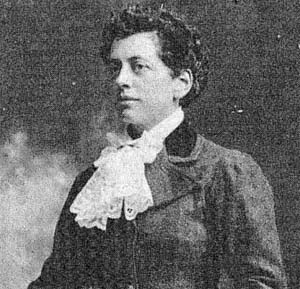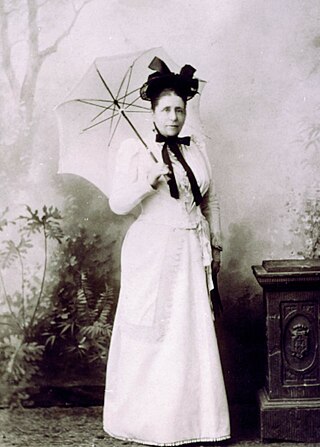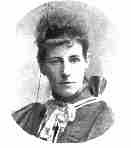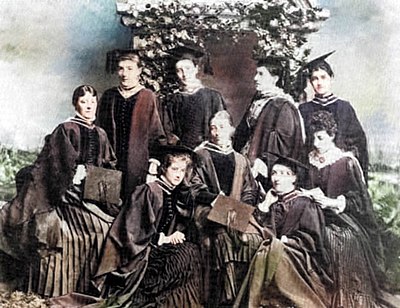
The Women's Social and Political Union (WSPU) was a women-only political movement and leading militant organisation campaigning for women's suffrage in the United Kingdom founded in 1903. Known from 1906 as the suffragettes, its membership and policies were tightly controlled by Emmeline Pankhurst and her daughters Christabel and Sylvia. Sylvia was eventually expelled.

The Royal University of Ireland was founded in accordance with the University Education (Ireland) Act 1879 as an examining and degree-awarding university based on the model of the University of London. A royal charter was issued on 27 April 1880 and examinations were open to candidates irrespective of attendance at college lectures. The first chancellor was the Irish chemist Robert Kane.

A gown, from the Saxon word, gunna, is a usually loose outer garment from knee-to-full-length worn by men and women in Europe from the Early Middle Ages to the 17th century, and continuing today in certain professions; later, the term gown was applied to any full-length woman's garment consisting of a bodice and an attached skirt. A long, loosely fitted gown called a Banyan was worn by men in the 18th century as an informal coat.
The following is a timeline of women's colleges in the United States. These are institutions of higher education in the United States whose student population comprises exclusively, or almost exclusively, women. They are often liberal arts colleges. There are approximately 35 active women's colleges in the U.S. as of 2021.
Events from the year 1884 in Ireland.
Alexandra College is a fee-charging boarding and day school for girls located in Milltown, Dublin, Ireland. The school operates under a Church of Ireland ethos.
Marion Kirkland Reid (1815-1902) was an influential Scottish feminist writer, notable for her A Plea for Woman which was first published in 1843 in Edinburgh by William Tait, then published in the United States in 1847, 1848, 1851, and 1852 as Woman, her Education and Influence under the name of Mrs. Hugo Reid. She was a member of the Ladies National Association for the Repeal of the Contagious Diseases Acts.

Queen Margaret College was a women-only higher education institution based in North Park House in Kelvinside, Glasgow, Scotland.

Mary Teresa Hayden was an Irish historian, Irish-language activist and campaigner for women's causes.

Isabella Ure Elder (15 March 1828 – 18 November 1905) was a Scottish philanthropist who took a particular interest in education, especially of women, and in the welfare of the people of Govan in Glasgow. In Govan alone, Elder was responsible for building Elder Park Library, a School for Domestic Economy, Cottage Hospital, the Cottage Nurses Training Home, and erecting a statue in honour of her husband John Elder. She also gave Elder Park to the people of Govan. Many of her philanthropic works are still open to the community today.

Alice Everett was a British astronomer and engineer who grew up in Belfast. Everett is best known for being the first woman to be paid for astronomical work at the Royal Observatory, Greenwich, when she began her employment at the observatory January 1890. In 1903 she was the first woman to have a paper published by the Physical Society of London. She also contributed to the fields of optics and early television.
Notable American Women, 1607–1950: A Biographical Dictionary is a three-volume biographical dictionary published in 1971. Its origins lay in 1957 when Radcliffe College librarians, archivists, and professors began researching the need for a version of the Dictionary of American Biography dedicated solely to women.
Isabella Maria Jane Mulvany was one of the Nine Graces, the first nine women to graduate from University with a degree in either Great Britain or Ireland. She was a pioneer in Women's education. She was the head of Alexandra School which prepared girls for entry to Alexandra College.

Alice Oldham (1850–1907) was one of the Nine Graces, the first nine women to graduate from University with a degree in either Great Britain or Ireland. Oldham was a leader of the campaign for higher education of women in Ireland and in particular of the campaign to gain admission for women to Trinity College Dublin.

The Vagliano Trophy is a biennial women's amateur golf tournament. It is co-organised by The R&A and the European Golf Association and is contested by teams representing "Great Britain and Ireland" and the "Continent of Europe". It is played in odd-numbered years; the Curtis Cup being played in even-numbered years.

Jessie (Janet) Campbell (1827–1907) was a British woman who helped to create the first higher education college for women in Scotland.
The 2017 Queen's Birthday Honours in New Zealand, celebrating the official birthday of Queen Elizabeth II, were appointments made by the Queen in her right as Queen of New Zealand, on the advice of the New Zealand government, to various orders and honours to reward and highlight good works by New Zealanders. They were announced on 5 June 2017.
The 2018 Queen's Birthday Honours in New Zealand, celebrating the official birthday of Queen Elizabeth II, were appointments made by the Queen in her right as Queen of New Zealand, on the advice of the New Zealand government, to various orders and honours to reward and highlight good works by New Zealanders. They were announced on 4 June 2018.










